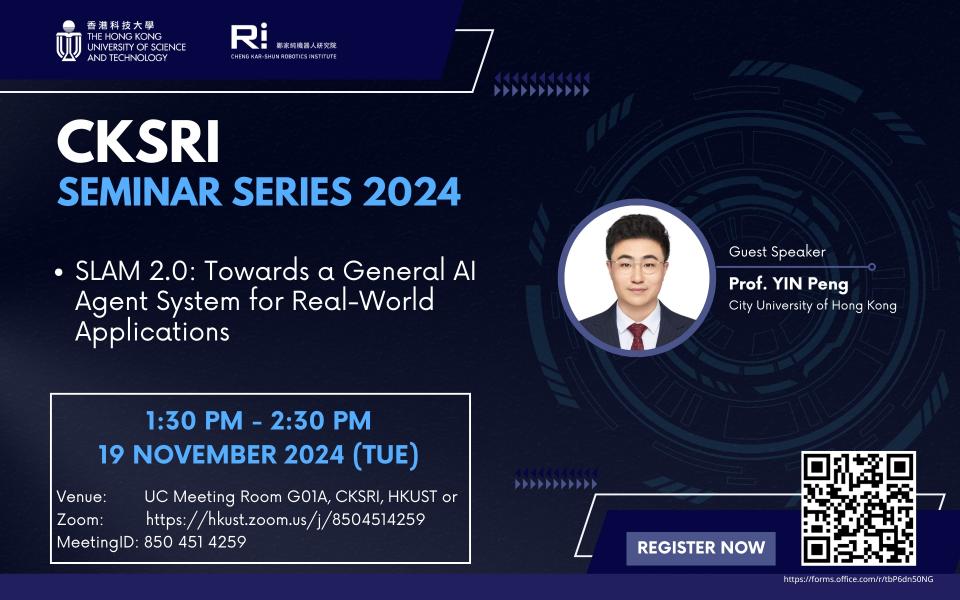CKSRI Seminar Series 2024 “SLAM 2.0: Towards a General AI Agent System for Real-World Applications"
Supporting the below United Nations Sustainable Development Goals:支持以下聯合國可持續發展目標:支持以下联合国可持续发展目标:
ABSTRACT:
This seminar has invited Prof. Peng Yin, Assistant Professor of the City University Hong Kong, to discuss SLAM 2.0.
Simultaneous Localization and Mapping (SLAM) has long been a cornerstone technology for intelligent robotics and autonomous driving. Over the years, SLAM has evolved into a system focused on precision and stability. However, as robotic systems rapidly advance toward generality and intelligence, the limitations of traditional SLAM systems are becoming increasingly apparent. SLAM 2.0 emerges in this context, not merely as a technology but also as an art.
The realization of humanoid localization and navigation systems is not solely reliant on high-precision 3D map construction or accurate dynamic obstacle detection. Instead, SLAM 2.0 places greater emphasis on the reuse and abstraction of scene information, highlighting the understanding and cognitive abilities required for complex scenarios. By introducing a Scene Operator subsystem, SLAM 2.0 effectively processes and utilizes diverse environmental information, enabling a high level of abstraction and flexible response to the physical world. The "memory" in localization and navigation systems goes beyond loop closure detection and the retrospective analysis of historical observations. It becomes a critical component in constructing a world model. Just as biological memory systems efficiently and cost-effectively manage localization and navigation, SLAM 2.0 proposes a more convenient and expedient approach for robotic systems to achieve re-localization and environmental understanding. The Memory Tank in SLAM 2.0 compresses and stores multimodal information, preserving topological representations of scenes, spatial relationships of static and dynamic objects, and implicit associations across multiple scenes. This enables intelligent agents to deeply understand and flexibly respond to the external world.
SPEAKER: Peng Yin, Assistant Professor at City University of Hong Kong, Founder of CyberOrigin, Expert in Embodied Intelligence, IEEE Member, PhD from the Shenyang Institute of Automation, Chinese Academy of Sciences, Former Project Scientist at Carnegie Mellon University Robotics Institute, Senior Advisor for NASA Mars Landing Project.
Peng Yin has led pioneering research in localization and navigation, including: CMU DARPA SubT Underground Robot Challenge, Localization and Modeling Lead (2019 Champion Team); NASA UAV Long-Range Localization Lead; CMU Bosch, Indoor 3D Reconstruction Project Lead; and NVIDIA Map Crowdsourcing Project Lead.
Peng Yin has published papers in top robotics conferences and journals, such as IROS, ICRA, RSS, RAL, IEEE T-RO, IEEE TIE, IEEE TITS, including three first-author papers in the prestigious IEEE T-RO journal.
